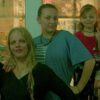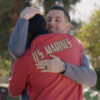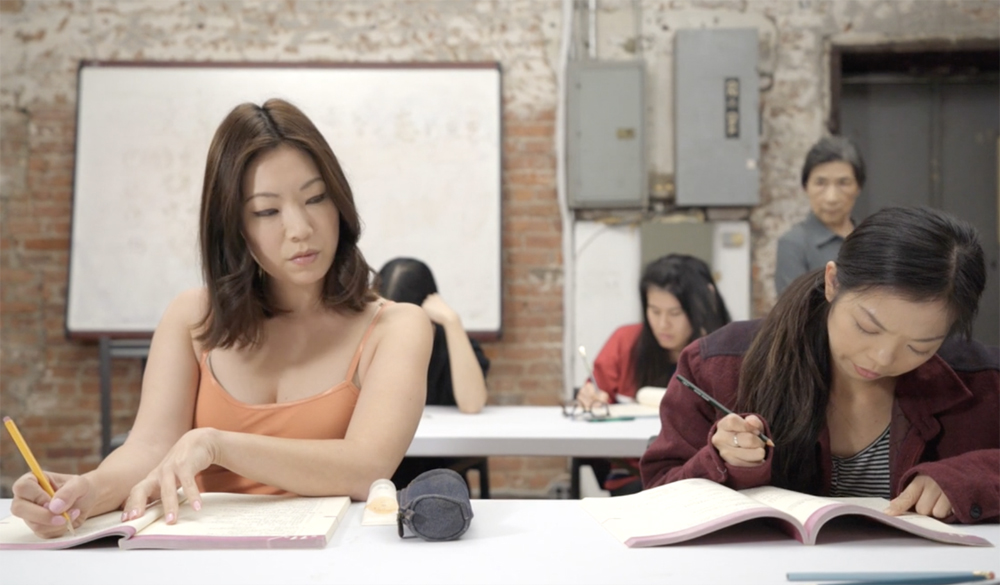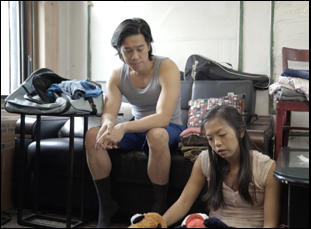When Judy Lei was the festival director for the Asian Cinevision Festival in New York, she’d hear time and again from filmmaker Q & As that a film would be made three times – first in the script, then on the set and finally in the editing room. No one had ever mentioned what would happen in the face of a pandemic.
“It was a pro-cess,” Lei laughed, on the eve of the premiere of her debut feature “The World’s Greatest,” a scrappy production that already had required constant rethinking with limited resources during its shoot in the fall of 2019 and needed significantly more when Lei learned that a planned second part of production would be complicated by COVID. As anxiety-inducing as this might’ve been for Lei, she had rewritten her own story before as “The World’s Greatest” describes as she revisits her teenage years growing up in New York’s Chinatown, having the burden of serving as her mother’s (Vanessa Kai) primary connection to the outside world when she doesn’t speak a word of English, not given any help from her older brother Ken (Leonard Wu) and feeling uncomfortable in school where she’s upstaged by her classmate Jessie (Cindy Chu), though the two strike up a friendship when Jessie wants to cheat off her tests.
While college offers an opportunity to change directions as it really did for Lei, what could be seen as tragedy for the angsty teen is reenvisioned as a comedy, taking any rough edges for either the character or the production and turning them into sharp observations. Having time during quarantine to take stock of what she had filmed, Lei channeled any energy required to push ahead into an irreverent ode to her younger self finding her way forward in the world, given to digressions and awkward situations, particularly as she tries to be friends with Jessie and starts to get involved a guy she likes in Jake (Curtis Lum). Although leaving town is appealing as a teen, Lei looks back on her home fondly as an adult, realizing the strength it gave her and it leads to a potent first feature where the trappings of its budget can’t get in the way of its heart. As the film debuts this week at the Los Angeles Asian Pacific Film Fest, the multihyphenate spoke about the process of adapting what was once a one-woman show to the screen, how running around led her to find her footing in the edit and casting her actors in a different light.
It started out as a solo show in 2016, and I always wanted to make it into a movie, but I didn’t have money or a lot of connections, so I [thought] writing a solo show maybe is the way to showcase myself as a performer, a writer and all that. The more I pursued the process, the more people became fans or actually saw me as an artist, so when the time came in 2019 when I wanted to do the Kickstarter to do the film, people supported in that way.
What was it like adapting the show to the screen?
In the solo show, a lot of the stuff happened in the classroom and in her home, so those things were interchangeable, so when it came time to write the script, I wrote it exactly how I wrote it in the solo show, but then budget came into the question – how are you going to get the school? How are you going to get the actors to come in and fill up the classroom? And I had to change a lot of things, so a lot of the things you see in the film wasn’t in the solo show and vice versa — it was painful cutting out all the classroom stuff. It was also a really hard [casting] process, so aside from doing all the positions you can ever imagine on a film set, I didn’t really have a producer who can reach out, but I’ve been a part of this film festival family for the past decade, so I know who the actors are.
I came up with the wish list and I signed up for IMDbPro and I hit up agents, like “This is the script and this is me, please join my film.” [They’d ask] “oh, what’s your budget for the film?” and a lot of agents stopped there, like, “Oh yeah, maybe this budget level isn’t what my talent is attracted to at this moment” or “they can be a part of the project if you spend the entire budget on them.” So I’d just pivot and go on down the line. I was specifically looking for actors who could speak Cantonese and Leonard’s a Mandarin speaker and Vanessa, who’s also a great theater actress, speaks Cantonese, but not as fluent as someone who grew up in Chinatown, but [since] I come from a theater background, rehearsal is so important to me, so whether we meet at a cafe or over the phone, we just did that. And Cindy was actually at my solo show here in L.A. She came as an audience member, so she saw it, we met up and I was like, “Oh, who can play Jessie?” She just fit the look or the demeanor, so I was like, “Oh yeah.”
When you start working with the cast, does it change the dynamics of this?
I think so. I bring things to the table and Leonard brought [his character] pretty naturally, but he asked me this question, “Why do you want to cast me? Because often times I’m typecast as a bad guy and I kill or people kill me.” I saw “Revenge of the Green Dragons” and he was a killer in that movie, but he was a very good, rounded actor and then Vanessa is clearly a powerhouse. A lot of people see Chinese women as one-dimensional or very quiet people, but my mom is anything but that. In public, she will be like that, but in private, she’s like “rarrh, rarrh, rarrh,” and when [Vanessa and I] met up for coffee before she signed on, the cadence in her speech, I was like, “Oh, she sounds like my mom.”
Is it true you actually got most of this in the can before the pandemic started?
We shot about 70% of it, and the plan was to shoot in December 2019 when the actors were available and let’s just go and the outdoor scenes with me would be pushed a little bit later. Then COVID hit, so we couldn’t go on and I was like, “Oh fuuuuuck.” When you watch the footage, you see the different production quality that comes along with being a first-time filmmaker who doesn’t have money, but a lot of the stuff that we shot indoors was all before COVID and I actually did not know how to finish the film until September 2021. The script changed a lot actually during the pandemic, so whatever script I had finalized isn’t what we ended up with in the final product, but I felt like all the messages I wanted to get through, I had to put it through a voiceover to capture the emotions. I studied in comedy also, and in the beginning, a lot of [cinematographers] asked me what’s the tone because when [they] read the script, it’s very serious, but [they] saw some funny elements to it, so I had to explain it to them – but I had in my mind those lines in place and I was very gung ho about doing the voiceover.
When COVID hit, I was in such a rush to finish the film because I was like, “Oh, I want it to be done.” but I was like, “I have no money now. I spent it all on the production,” so what am I going to do?” I joined a group of runners in Chinatown called Run for Chinatown and we’d run through the neighborhood and I think at that moment, just running through and seeing the neighborhood, I’d run through all my life and I don’t think I ever saw the beauty of my hometown, and I picked up my iPhone and went outside and I was just filming Chinatown, [thinking] maybe I’ll put it in between the scenes. [At the same time] I also met a filmmaker who got me into Woody Allen movies, so I watched “Manhattan” and that montage in the beginning and through that, I said, “Let’s just do that, but with Chinatown.”
Were there important images to you to capture in that?
Yeah, every frame in the beginning is a time capsule of my life or generally where I grew up. Chinatown is gentrifying, so even the lion from HSBC Bank, a huge bank in Asia that has chapters in New York — it suddenly shut down, so I thought of not including that, but it’s such an important part of history because Citizens Bank might throw out the lions.
What’s it like to get to the L.A. Asian Pacific Film Fest with a feature under your belt?
I’ve been crying since I got the news it’s going to be playing here. I mean I cried throughout the whole entire process because I think part of me is hesitant in reaching out to other filmmakers for help, and when I do, they all have their own little projects they’re working on, so they can’t help as much, so I had to figure out a lot of things by myself. When I was directing it, I had a really strong sense it has to be a film about Chinatown and about this girl, but I never really thought about the outcome. My dream was to show it at a film festival, but even if it didn’t [make it there], there’s so many channels nowadays that you can put it up online, and I see this film as my first baby, so I’m figuring out a lot of things with it. I learned a lot about filmmaking from this and it’s my film school, so I want to take all my skills and all the things that I learned from this project and just inject it into the next one, whatever it is.
“The World’s Greatest” will screen at the Los Angeles Asian Pacific Film Festival on May 13th at 7 pm at the the Tateuchi Democracy Forum at JANM.





